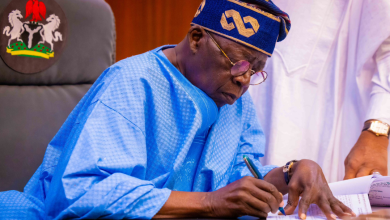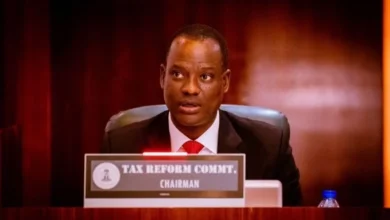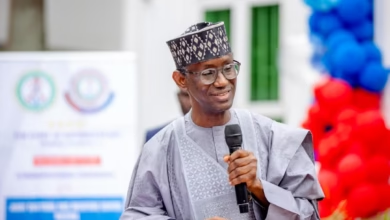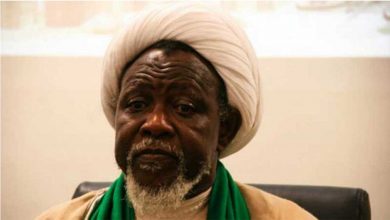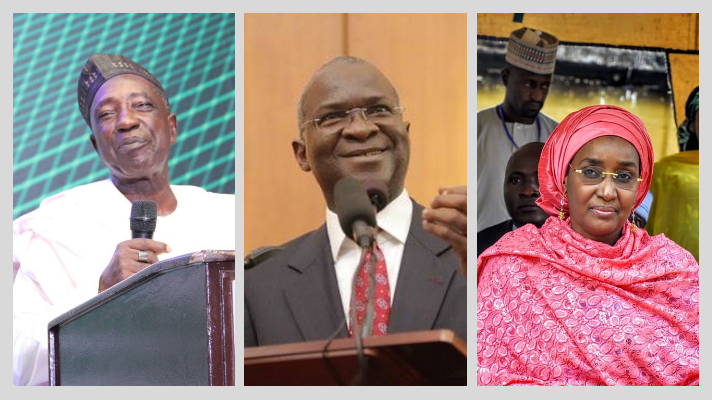
By Salisu Na’inna Dambatta
The concept and scope of this item is deliberately as it is because with the just-constituted cabinet of the Muhammadu Buhari second term presidency, one cannot exhaust the positives it portends for the general progress of this country.
Each member of the new cabinet has at least one of these qualities, but majority possess them all and have more: competence as a technocrat, a tested hand in project initiation and conclusion or a reliable ally to Buhari that can be trusted with serious public responsibility regardless of its enormity.
Before making points about Alhaji Nanono, Lawyer Fashola and Hajiya Sadiya, look at Malam Adamu Adamu who is returning to the vital Federal Ministry of Education where under his hands the inherited number of the scandalous 13.5 million out of school children dropped by 3,000,000 in less than 36 months of concerted action.
He restored the study of history and brought many other improvements to the curriculum at all levels of education, revitalized the Arabic and Islamic Education Board, turned around the Tertiary Education Fund by ensuring that it is better focused under an excellent Executive Secretary, as more private Universities, Poly and Mono Technics and Colleges of Education were licensed to produce skilled manpower for the country.
The Federal Ministry of Education under his watch is to establish more post primary technical colleges, but the Universal and Basic Education Commission needs some rigorous re-orientation to reduce the excessive number of primary school children studying under trees and uncertificated “teachers” in many states of the country.
The plan to restore Teachers Training Colleges that were the incubating centres of excellent teachers for primary schools should be accelerated by Malam Adamu Adamu and other members of the National Council on Education.
Now Alhaji Sano Nanono as the Minister of Agriculture and Rural Development. I knew much about his long-term successful foray into the agricultural sector as a commercial, large scale farmer via late Alhaji Magaji Ɗambatta, who always praised his examplary loyalty and commitment to agriculture.
As a leading activist in the promotion of crop production, animal husbadary, agricultural modernisation and mechanisation as well as the development of the value chains of agro-commodities, I have no doubt that given his pedigree as a former banker, practicing herder, food processor and his keen interest in changing the face of agricultural practice, he is likely to play his new role effectively.
But he needs to intensely study the sector, genuinely identify the defects that need urgent elimination, lend his business skills and capacity to keep his private agricultural business running well to the FMARD to make the agricultural sector the launchpad for deepening food security, the revitalization of the livestock sub-sector and ensure that the country stops importing rice, wheat, dairy products and a host of other agricultural commodities the country can produce.
Alhaji Sabo Nanono should not assume that the task of sustaining the position of the agricultural sector as the single largest contributor to the wealth of the nation is easy. It is not. It requires focus, determination and the courage to squarely face vested interests that always find collaborators in unexpected quarters to cripple any real effort at our country’s agenda to transform agriculture to its rightful place.
President Muhammadu Buhari has set up a National Council on Food Security, which he chairs. Nanono should make that secretariat be forthcoming with information about its activities, success and the expected roles of Nigerian farmers as its food production arm.
The areas of commodity pricing, preservation, storage, processing, packaging and marketing should be given priority. The engagement of the various segments of the agricultural interests should not be tilted toward the gilded “farmers.” Doing so will stagnate, or even reverse, the fortunes of the sector. Alhaji Sabo Nanono in Agriculture should not allow that to happen.
The conception and establishment of the Ministry of Humanitarian Affairs and Disaster Management tallies with the national need to pay more attention to the tragic humanitarian situation inflicted on the country by a combination of insurgency, banditry, robbery, kidnapping sundry crimes and, environmental disasters like floods, drought, desertification, accidental or deliberate oil spillage, large-scale fires, communal conflicts and famine.
Creating the Ministry, is a proof of a genuine humane nature and orientation of the Muhammadu Buhari-led administration that also puts into practice some provisions at Chapter Two in the Directive Principles of State Policy of the amended 1999 constitution.
Hajiya Sadiya Umar Farouk,, the pioneer Minister for Humanitarian Affairs was truly effective in her previous job of caring for Refugees, Migrants and Internally Displaced Persons. She was all over the country providing various services to the category of persons under the purview of the Commission. Many observers said her agency was more visible and forthcoming in its role than the National Emergency Management Agency (NEMA).
And contextualise that in Nigeria people heard of. missing conveys of trailers laden with relief materials meant for victims of insurgency, especially basic foodstuff and medicaments in the open savanna around Yobe and Borno states. This is unlikely to happen under watch.
Hajiya Sadiya Umar Farouk should devise strong control and tracking mechanisms to ensure that whatever support is being delivered to the segment of the Nigerian society the new Ministry is set to cater for is safe. This is particularly essential given the fact that the announcement of the creation of the Ministry has raised expectations very high. Meeting those expectations will heighten the credibility of the Government, protect the integrity of the President as a humane leader and sustain the good reputation the Minister earned as the National Commissioner at the National Commission for Refugees, Migrants and Internally Displaced Persons.
It is true that the former Minister for Power, Works and Housing, Alhaji Babatunde Raji Fashola, now Minister of Works and Housing, was building bridges, reconstructing roads and providing thousands of houses in 34 states and the Federal Capital Territory, he cannot rest until the hundreds of road renewal projects in the country are completed. It is his task, a national honour for him to be in charge of that enormous duty. His record show that he is a capable person.


